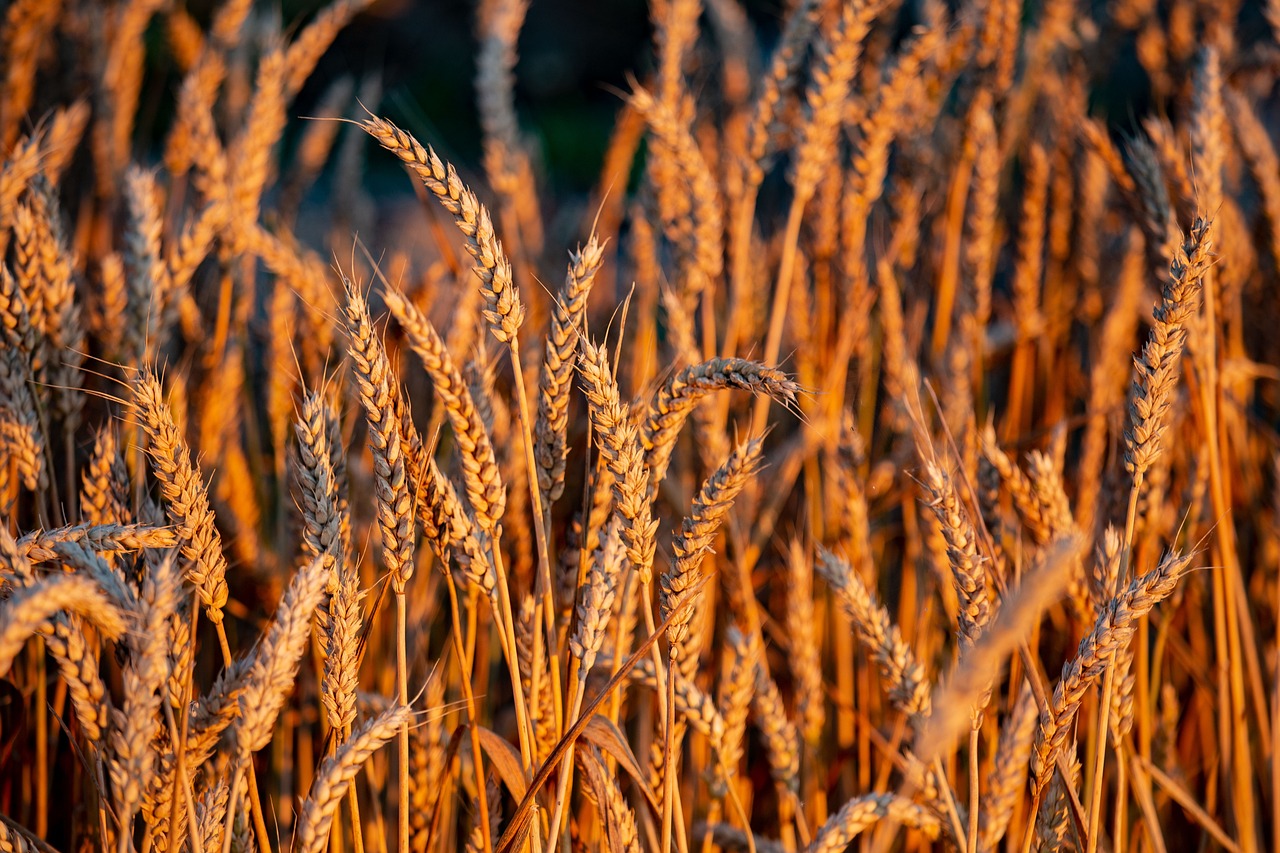First Fruits
Leviticus 23:9-14
9 And the Lord spake unto Moses, saying,
10 Speak unto the children of Israel, and say unto them, When ye be come into the land which I give unto you, and shall reap the harvest thereof, then ye shall bring a sheaf of the firstfruits of your harvest unto the priest:
11 And he shall wave the sheaf before the Lord, to be accepted for you: on the morrow after the sabbath the priest shall wave it.
12 And ye shall offer that day when ye wave the sheaf an he lamb without blemish of the first year for a burnt offering unto the Lord.
13 And the meat offering thereof shall be two tenth deals of fine flour mingled with oil, an offering made by fire unto the Lord for a sweet savour: and the drink offering thereof shall be of wine, the fourth part of an hin.
14 And ye shall eat neither bread, nor parched corn, nor green ears, until the selfsame day that ye have brought an offering unto your God: it shall be a statute for ever throughout your generations in all your dwellings.
In Leviticus 23:9-14, YeHoVaH Elohim instituted the First Fruits offering for the children of Israel to accomplish several important spiritual purposes:
- Acknowledge YeHoVaH Elohim as the Source of Blessings: The First Fruits offering was meant to remind the Israelites that Elohim was the source of their abundance. By bringing the first of their harvest to Elohim, they acknowledged that everything they had—whether crops, livestock, or any other provision—was a gift from Elohim. This act of bringing the first portion was a public acknowledgment that Elohim was the giver of all good things (Leviticus 23:10-11).
- Act of Faith and Trust: By offering the first of their harvest before they had fully reaped the entire crop, the Israelites demonstrated their faith and trust in Elohim’s continued provision. It required them to rely on Elohim, trusting that He would provide the rest of the harvest. This act symbolized their belief that Elohim would fulfill His promises and meet their needs (Leviticus 23:10-11).
- Set Apart the Best for Elohim: The First Fruits offering signified the importance of giving Elohim the first and best of everything. By offering the first sheaf of the harvest, the Israelites were consecrating the beginning of their harvest to Elohim, dedicating it entirely to Him. It was a way of honoring YeHoVaH Elohim with the first part of what they had received (Leviticus 23:10-11).
- Remind the Israelites of Elohim’s Deliverance: The offering of First Fruits also connected the people of Israel to their history of deliverance from Egypt. The fact that they had land and a harvest was a result of Elohim’s covenant faithfulness to them. The offering served as a tangible reminder of Elohim’s power, His deliverance, and His promises of blessings (Leviticus 23:9-10).
- A Call to Worship and Thanksgiving: The offering was also a way to express gratitude to Elohim for His provision. It was not only a ritual sacrifice but an act of worship, as the people thanked Elohim for His goodness in providing for them and showing them favor. Through this act, the Israelites demonstrated their thankfulness to Elohim for His faithfulness and abundant blessings (Leviticus 23:10-11).
Today, remembering First Fruits is not only about honoring Elohim with the first of the physical harvest, but also recognizing and dedicating the first and best of all areas of life, including our time, talents, and resources.
While the specific ceremonial aspects of First Fruits (such as the bringing of physical offerings of the harvest to the temple) are not required under the New Covenant, the principle of offering the first and best to Elohim remains relevant.
Here’s how we can apply First Fruits today, according to biblical principles:
To remember the principle of First Fruits as described in Leviticus 23:9-14, we can apply it to our lives today by being good stewards over our time, talent, and treasures, recognizing that everything belongs to Elohim. Here’s how we can apply the concept of First Fruits to our lives:
1. Time: Prioritize Elohim First
Just as the Israelites gave the first of their harvest to Elohim, we should dedicate the first portion of our time to Elohim. Starting our day with prayer, worship, praise, & bible reading. Putting Elohim first in our schedule before anything else.
Scripture References:
Matthew 6:33 – “But seek first the kingdom of God and His righteousness, and all these things will be added to you.”
Psalm 63:1 – “O God, You are my God; early will I seek You: my soul thirsts for You, my flesh longs for You.”
By starting our day with Elohim, we acknowledge His supremacy and make Him the priority in our lives.
2. Talent: Use Your Gifts for Elohim’s Glory
The talents, abilities, and skills we have are gifts from Elohim. The first use of our talents should be for His glory, whether it’s in our work, ministry, or relationships. We dedicate our best efforts to serving Elohim and others, using our abilities to honor Him.
Scripture References:
1 Peter 4:10 – “As each has received a gift, use it to serve one another, as good stewards of God’s varied grace.”
Romans 12:1-2 – “I appeal to you therefore, brothers, by the mercies of God, to present your bodies as a living sacrifice, holy and acceptable to God, which is your spiritual worship.”
Using our talents for Elohim’s work ensures we give our best efforts back to Him, just as the Israelites gave their best harvest.
3. Treasure: Give Generously
The principle of First Fruits teaches us to give gifts to support Elohim’s work. By doing so, we acknowledge that everything we have comes from Him and is ultimately His.
Scripture References:
Proverbs 11:25 – “A generous person will prosper; whoever refreshes others will be refreshed.”
1 Chronicles 29:14 – “But who am I, and who are my people, that we should be able to give as generously as this? Everything comes from you, and we have given you only what comes from your hand.”
2 Corinthians 9:6-7 – “Remember this: Whoever sows sparingly will also reap sparingly, and whoever sows generously will also reap generously. Each of you should give what you have decided in your heart to give, not reluctantly or under compulsion, for God loves a cheerful giver.”
Luke 6:38 – “Give, and it will be given to you. A good measure, pressed down, shaken together and running over, will be poured into your lap. For with the measure you use, it will be measured to you.”
Acts 20:35 – “In everything I did, I showed you that by this kind of hard work we must help the weak, remembering the words the Master Yeshua himself said: ‘It is more blessed to give than to receive.’”
Giving to the work of the Kingdom is an act of faith that recognize YeHoVaH Elohim as the ultimate provider.
4. Recognize Everything Belongs to Elohim
When we remember that everything we have—our time, talents, and treasures—ultimately belongs to Elohim, we are reminded to offer Him the best of what we have, just as the Israelites offered the first portion of their harvest.
Scripture References:
Psalm 24:1 – “The earth is the Lord’s and the fullness thereof, the world and those who dwell therein.”
1 Corinthians 10:26 – “For ‘the earth is the Lord’s, and the fullness thereof.”
This recognition encourages us to live with a spirit of stewardship and gratitude, remembering that we are caretakers of Elohim’s gifts, not owners.
Conclusion
By prioritizing Elohim with our time, using our talents for His kingdom, and offering our treasures with generosity, we honor the principle of First Fruits as taught in Leviticus 23:9-14.
This practice encourages us to live with gratitude, understanding that all we have belongs to Elohim, and that offering the first and best of ourselves is a way of honoring Him in all aspects of our lives.

